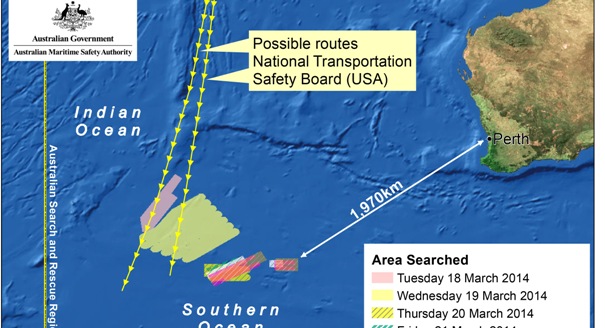Two weeks search for the missing Malaysia Airlines plane was an example of both impressive regional cooperation and discouraging limits of such cooperation in the Asia-Pacific region.
On the one hand, it is the largest search operation in the history. On March 20 Malaysian authorities mentioned 29 planes and 6 helicopters, 18 ships, and 21 satellites, involved in the search. During previous days the operations facilities amounted to more than 50 planes and 40 ships of 26 countries. China alone used the data from about 20 satellites. The total area of the operation had reached 7.7 million square kilometers. The search for the missing plane has become a top priority for many countries, including China and the United States.
- Inability to rapidly and cooperatively response to the disappearance of the MH370;
- Poor coordination of the international search operation, making some countries to drop out of it;
- Reluctance to share data from intelligence services and armed forces with Malaysian authorities;
- Delays in use of whole range of available sources, including the information from the satellite operators;
- Lack of ability of regional countries to monitor their air space and territorial waters;
- Unveiled concern of some regional countries about significant military deployment of China in the framework of the search operation.
Two weeks ago it seemed that the Association of Southeast Asian Nations would able to efficiently response to the MH370 challenge. On March 8 Malaysian Foreign Minister Anifah Aman informed the public that his country had asked help from other members of ASEAN. Yet in response 47 years old Association demonstrated a low-level readiness for such kind of events. It’s impossible even to find any information about ASEAN reaction on both the plane disappearance and Malaysian request on the website of the organization.
Ekaterina Koldunova, deputy dean of the School of Political Affairs at the Moscow State Institute of International Relations of the Russian Ministry of Foreign Affairs, explained the unpreparedness of ASEAN: “ASEAN declares that it is not a military alliance. Yet there are regular exercises of military, counter piracy, and counterterrorism forces of ASEAN member states and external powers. These drills demonstrate that ASEAN is hardly to be regarded as a fully independent organization in the abovementioned fields, since external powers play important role in the exercises. However there are successful initiatives such as Eyes-in-the-Sky and Malacca Straits Coordinated Patrol. But regional powers had to start them to protect sea lanes against piracy, since the alternative option was to have navy deployment of the United States. ASEAN security cooperation faces limits, including lack of experience, proper equipment, and trust. Having a bunch of separatist, extremist, and terrorist groups, enjoying external support, regional countries are reluctant to deepen cooperation with each other.”
Headlines reflect public understanding of the ASEAN role in the MH370 search: “Flight MH370 Shows Limits of ASEAN’s Maritime Cooperation,” and “How Can We Trust ASEAN Integration?”
The missing Malaysia Airlines plane demonstrated an urgent need for expanding fields of the ASEAN security cooperation far beyond existing practices. Koldunova believes, that “the MH370 case must boost security cooperation of ASEAN and help them to regionalize security mechanisms of the Association.”
Deepening the ASEAN security cooperation should include following approaches among others:
- The rapid response capability of ASEAN should be based on regional mechanisms;
- The regional mechanisms should consist of well-timed crisis management, regional efforts coordination, and data sharing;
- Aviation safety should be one of the main pillars of regional security.





